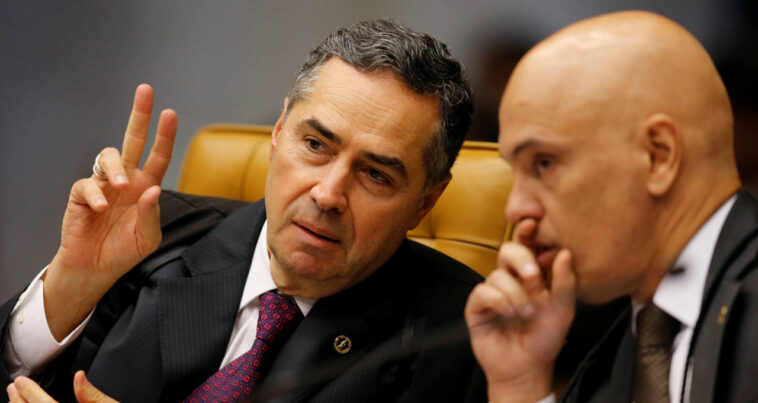RIO DE JANEIRO, BRAZIL – (Opinion) Is Democracy the best form of government? Do people have the right to question it? Do they have the freedom to question whether computer voting machines can be hacked and corrupted? Or, are such discussions criminal, subject to arrest and imprisonment?
Some countries like the U.S. say democracy is critically important, a fundamental human right.
Other countries are nondemocratic, such as China. For centuries some European countries and Brazil were ruled by kings, queens, emperors, and dictators.

Democracy has been a fairly recent experiment. In Brazil, does anyone dispute that Getulio Vargas was one of the greatest leaders of the country? Yet, he was not initially elected but instead was a dictator after a coup.
So why is it not a legitimate question whether democracy is the best form of government?
Read also: Bolsonaro says Brazilians are “appalled by the repression of freedoms” by Judiciary
Even highly sophisticated computers can be hacked. Why is it a problem to talk publicly about whether voting machines can be hacked? It would seem to be an important subject if one is really interested in protecting democracy.
Likewise, a constitution is not written and handed down by God, like the commandments were to Moses. People are not slaves of a constitution. Can they not talk about changing it?
In the marketplace of free expression, ideas compete with one another, and the best will naturally be chosen and prevail. Freedom of speech is a fundamental and necessary human right.
Read also: Brazil’s Bolsonaro to ask Congress to impeach Supreme Court Justices who repeatedly investigate him
When a person is prosecuted for speaking their mind, it has a chilling effect on everyone. People are afraid to speak openly and have to be careful what they say lest they, too, get arrested. The mere possibility of being arrested for speaking effectively destroys freedom of speech and thought.
Is it really democracy if there is no freedom of expression that includes all sides of the political spectrum? No.
Democracy requires a free and open contest between opposing viewpoints. Democracy means choice. When one side is eliminated because of arrest, groundless investigations, and intimidation, democracy no longer exists and has been replaced by tyranny.
Read also: Brazil’s Supreme Court opens investigation against Bolsonaro for fake news undermining democracy
In fact, to arrest a person for questioning the merits of democracy or suggesting change, is oppression, and is no different than dictatorship.
All judicial systems are founded on the principle of fairness and impartiality. The goddess Lady Justice is blindfolded as she weighs the two sides of a scale so that she does so without favoring either side.
A JUDGE CANNOT ALSO BE A PROSECUTOR
A judge cannot also be a prosecutor. A judge must be nonpartisan, maintaining neutrality until the evidence is fully presented by both sides. A prosecutor is a partisan advocate for the government position.
The two roles are mutually incompatible. An advocate is not impartial. A judge must be impartial. It is impossible to be partial and impartial at the same time. It is that simple.
A judge cannot be fair to both sides, as he must if he is on one side. If a judge, as investigator and prosecutor, advocates for one side, the proceeding is biased, and the outcome is certain.
Read also: Brazil’s Supreme Court is setting precedents potentially dangerous to democracy
Biased judges will not have the blindfold of Lady Justice on; instead, they will likely rule in favor of their own position. The judge who is an advocate will tip the scale so that his position prevails: it is an advocate’s job to win.
It is a judge’s job to be fair. The conflict of interest is so obvious, and the threat to fairness and justice so manifest, that to act otherwise destroys any respect for the institution of the judiciary.
It is difficult to imagine anything more injurious to the necessary respect for the judiciary than for judges to be advocates against the parties who appear in their court.
The current crisis, created by the Supreme Court (STF) crossing the line into advocacy, gives people outside Brazil the impression that Brazil is chaotic and unstable, with no one clearly in charge, with a broken political and judicial system unsafe for foreign investors.
It undercuts the court’s authority among the people by destroying their belief in the court as an impartial judicial forum where all will be treated fairly and not prejudged based on positions the judges took before the trial began.
A court that ceases acting as an impartial tribunal and uses its power in the political arena damages democracy far more than a free and open discussion of ideas by members of Congress, presidents, and the people.
Read also: Dealing with polarized political positions is one of Brazil’s biggest challenges – survey
Most importantly, threatening freedom of thought and expression – by arresting, investigating, harassing, and punishing those the judges disagree with – dangerously threatens democracy itself.
A dictatorship of ideas is not democracy. This should be of great concern to everyone, regardless of their political beliefs. A dangerous precedent is set when freedom is lost for one person or group; history shows it is often soon lost for everyone else.
The court should protect fundamental freedoms, including the basic human right of free speech, by not making free thought and speech criminal.

